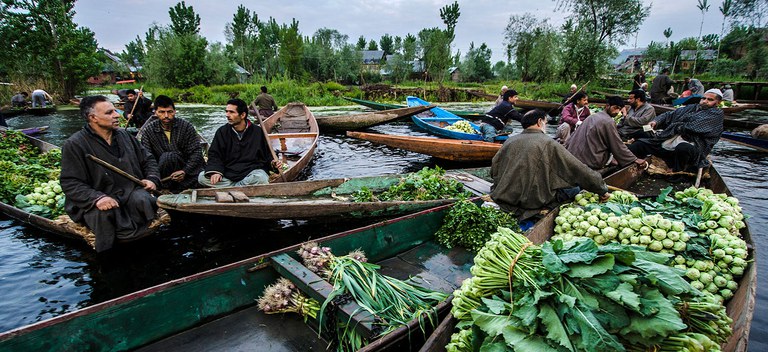Floating Vegetable Market
This photo shows Dal lake in Srinagar, Jammu and Kashmir in India. The lake is known globally as the "Jewel in the Crown" of Kashmir due to its beauty and floating vegetable market. It is a popular tourist destination. The more than 22 square km lake has nearly 50 hamlets that provide housing to several hundred communities. These people depend on the floating land mass of the lake, which is comprised of matted vegetation and soil unattached to the lake bottom. This floating land mass is rejuvenated by thick ice-coating during the period of extreme cold. It also provides organic fertiliser through a perpetual ecological system. The local traders carry fresh vegetables to the floating market, where they sell from canoes and dinghis. It is a unique ecosystem that is rich in planktons and zoo-planktons, which come from the Himalayas. This helps maintain a variety of fish and flowers, which have provided a sustainable livelihood to communities for centuries. This lake also provides drinking water to the localities. Several government agencies, both from India and abroad, collaborate in maintaining the lake's natural ambiance and sanctity as per the protocols of nodal government tribunals. Photo: Amitava Chandra
https://biodiversitylinks.org/site-images/slideshow-1/floating-veg-market.jpg/view
https://biodiversitylinks.org/site-images/slideshow-1/floating-veg-market.jpg/@@download/image/floating-veg-market.jpg
Floating Vegetable Market
This photo shows Dal lake in Srinagar, Jammu and Kashmir in India. The lake is known globally as the "Jewel in the Crown" of Kashmir due to its beauty and floating vegetable market. It is a popular tourist destination. The more than 22 square km lake has nearly 50 hamlets that provide housing to several hundred communities. These people depend on the floating land mass of the lake, which is comprised of matted vegetation and soil unattached to the lake bottom. This floating land mass is rejuvenated by thick ice-coating during the period of extreme cold. It also provides organic fertiliser through a perpetual ecological system. The local traders carry fresh vegetables to the floating market, where they sell from canoes and dinghis. It is a unique ecosystem that is rich in planktons and zoo-planktons, which come from the Himalayas. This helps maintain a variety of fish and flowers, which have provided a sustainable livelihood to communities for centuries. This lake also provides drinking water to the localities. Several government agencies, both from India and abroad, collaborate in maintaining the lake's natural ambiance and sanctity as per the protocols of nodal government tribunals. Photo: Amitava Chandra



